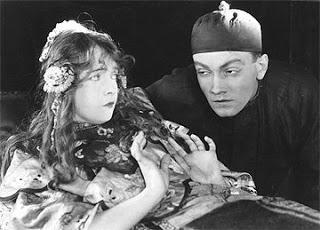
"The Yellow Man's youthful dreams come to wreck against the sordid realities of life."
After two colossal epics, D.W. Griffith turned to a simpler melodrama. Broken Blossoms (1919) presents an earnest but clunky lesson in tolerance, presented with impeccable style.Cheng Huan (Richard Barthelmess) emigrates from China to England, hoping to spread Buddhist lessons of peace to the inscrutable West. Cheng finds Britons unreceptive to his message, and winds up running a junk shop in London. He rescues Lucy Barrows (Lillian Gish), daughter of abusive boxer Battling Barrows (Donald Crisp), and develops an affection for her. When Burrows finds out, he responds with predictable fury.
Broken Blossoms is far easier to stomach than Birth of a Nation, even if Griffith tracks in different stereotypes. Cheng is a walking cliché, speaking in fortune cookie aphorisms, smoking opium and recoiling from Western society. Heroically simple-minded, he falls for Lucy but won't act on his dreams of miscegenation. Appropriately chaste, he risks his life to rescue Lucy, fight Barrows and defy authorities. In traditional fashion, he and Lucy atone for any impure thoughts through death.
Griffith contrasts Cheng's placid demeanor with Western violence: from his introduction trying to break up feuding sailors, Cheng's constantly baffled by Anglo intransigence. Hence Barrows, a brute who alternates between boxing and beating his daughter, he's defined purely through violence, except when slathering Cheng with racial epithets. Lucy's caught between them, an utterly wretched girl as innocent as the dolls she ponders in Cheng's shop. So miserable she has to manually fix her lips into a smile, she's rejected by her father, kind society, even streetwalkers.
Though far smaller than Nation or Intolerance, Blossoms allows Griffith equal chance for creativity. The movie abounds in memorable imagery, with filthy London streets swimming in fog, shadow and dirt. Cast in the Limestone neighborhood, there's no grandeur on display, merely poverty, crime and heartbreak. Griffith employs savagely evocative close-ups and typically skilled montage works, whether cutting between Cheng's smoky reveries and his temples at home, or his tending to Lucy while Burrows boxes an opponent. Griffith's influence on German masters, especially G.W. Pabst, bleeds through every frame.
The smaller scale allows the actors more range than previous Griffith works. Lillian Gish, Griffith's favorite leading lady, is endearingly vulnerable and harsh, conveying Lucy's wounded desperation through gestures and heartbreaking facial expressions. Donald Crisp, later a venerable character actor, provides imposing physical presence. Richard Barthelmess overcomes yellow face and mannered characterization with a restrained, human performance; he's not convincingly Asian, but he does win our sympathy.
Hollywood's never known how to handle Asian characters, even in our more enlightened age. Broken Blossoms at least leans towards condescension rather than hatred, a small step in the age when Americans still raged against the "Yellow Peril."

